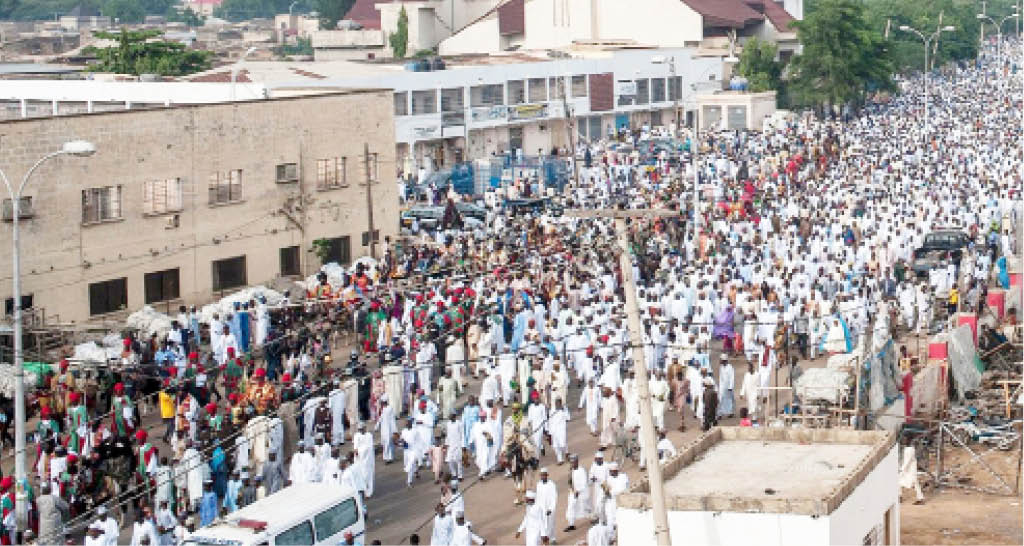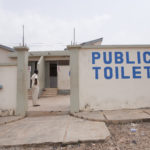Ahead of this year’s Eid-el-Kabir celebration on Friday, Muslim faithful are planning a low-key approach to mark the day while also adopting proactive measures to mitigate the spread of COVID-19 pandemic in the country.
Daily Trust reports that some states heavily hit by COVID-19 like Kano and Jigawa states last week announced ban on Sallah festivities.
The Secretary to the Government of the Federation (SGF) and Chairman of the Presidential Committee on COVID-19, Boss Mustapha last weekend said the Federal Government was encouraged that some state governments had taken proactive measures to ban public festivities of the Eid-el-Kabir, expressing hope that the ban would be observed and replicated by other states.
The Minister of Health, Osagie Ehanire, also cautioned Muslim faithful saying: “Since the risk of crowding cannot be ruled out in places of worship and pose a serious hazard for COVID-19 transmission, it is very wise that persons over 60 years, the obese and those in treatment for hypertension, among others, should pray at home. I also strongly advise that travel be avoided in this period except for a critical reason.”
Muslim faithful plan low-key celebration
A survey across states and interviews with Muslim faithful indicate that preparations are being done with caution due to existing preventive measures and rules for curbing the spread of the COVID-19 pandemic.
In Lagos the ban on the religious gathering is still in place and there is uncertainty over when it would be lifted. If the ban is not lifted until the Sallah day, it then means the faithful would be confined to their respective homes to celebrate with their families.
A Muslim faithful, Alhaji Kazeem Olanrewaju, told our correspondent that with the extant ban on religious gatherings, he might celebrate the festival with his family without slaughtering the sacrificial ram.
“This is because I usually share the ram meat with friends who visit from many parts of Lagos and it might not be safe to entertain guests because of the COVID-19 concerns,” he said.
In Nyanya suburb of Abuja, Hajiya Saratu Ibrahim said although her family had bought the ram in preparation for the Eid, her only challenge was not being able to go to the prayer ground because she envisaged mass gathering.
“I have not stepped out of my house for nearly four months because as an older person, I needed to be much more careful. However, I will observe my prayers at home and restrict visitors coming in during the festivity,” the septuagenarian said.
Bolaji Yusuf, a civil servant who lives in Gbagalape community in the FCT also ruled out visits to family and friends as was the case last year during the big Sallah.
“It is better to be cautious. I can risk it by going to work and doing other things but not the health of my children and wife. I will go for prayers but my family will stay at home. We listened to Tafsirs at home during Ramadan and celebrated Eid-el-Fitri under COVID-19 lockdown, so it is not a new thing,” he said.
Gambo Ibrahim, a mini kiosk operator in Apo Resettlement of Abuja, said he was more concerned with how to buy ram and Sallah clothes for his children.
“We won’t have a big feast this year. Last year, I bought two rams, one for my family here in Abuja and one for my aged parents in Kano. This year, I can’t even afford one. I sent my family to Kano on the instruction of my parents,” he said.
Another Abuja resident, Yau Muhammed, said he would attend the congregational prayer on the Sallah day despite fears of the spread of the coronavirus.
Muhammed said already he has been observing the preventive measures while praying in the mosque and that the Sallah day would not be different. However, he said the celebration this year would be on a low key for his family.
Aliyu Tahir, a resident of Tudun Wada Quarters in Kano said it would be another low-key celebration for him.
“This Sallah is usually the best for us all but with the Coronavirus, visits are out of it. I often take my family out to see things and we visit Gidan Zoo (Kano Zoological garden). These fun events are out of it this year,” Tahir explained.
Clerics call for proactive steps
Daily Trust also spoke with clerics and religious leaders in some states who stressed the need for taking proactive steps ahead of the Eid celebration.
The Secretary-General of Jama’atu Nasril Islam (JNI) in Nasarawa State, Ustaz Muhammad Ali said: “We are preparing to celebrate Sallah, but we have to heed to the teachings of Islam which state clearly that cleanliness of body and the environment must be observed. We are still calling on people to abide by the directive of constituted authority and Islamic leaders to avoid contracting the Coronavirus,” he said.
He said the Sultan of Sokoto, Alhaji Muhammad Saad Abubakar has pronounced that people should avoid going to Eid grounds for prayers to avoid mixing with a large crowd, adding that this is subject to the directive of different states in the country.
“We are awaiting the directive of the state government whether to observe the Sallah congregation or not. But we are still calling on the people to observe physical and environmental hygiene always,” Ustaz Ali said.
The National Missioner and Chief Imam of Ansar-ud-deen Society of Nigeria, Sheikh Abdulrahman Ahmad, in Lagos, said the partial lockdown in the state subsists and that has affected congregational prayers. “The Eid Adha would be celebrated like the previous Eid was marked when Muslims observed the two-rakat prayers with their families without the Khutbah (the preceding sermon).”
Sheikh Ahmad however said there was no reason for a Muslim who had the capacity to slaughter a ram not to do so.
A Kaduna based Islamic scholar, Sheikh Ahmad Gumi, has called on Muslim faithful to observe all the safety protocols if they must attend the Eid prayers to avoid spreading COVID-19.
Sheikh Gumi who often observes the Eid prayers at the Sultan prayer ground in Badarawa part of Kaduna metropolis assured that safety measures would be in place, while allowing the elderly, women, children and people with underlying illnesses remain at home during Eid.
“Even at that, we have been advocating that all measures based on experts and health practitioners’ advice must be adhered to. Eid prayers are done in open places or fields, and it will be easy to maintain the social distance rule since it’s outside,” he said.
The Chief Imam of Millatu-Ibrahim Friday Mosque in Sauna Quarters in Kano State, Malam Ali Dan Abba, said Chief Imams of Friday mosques have been delivering sermons on the importance of obeying health officials’ advice on staying healthy.
The leader of Islamic Affairs in Rivers State, Alhaji Nasir Ohor, said there would be no congregational gathering during the Sallah celebration.
Speaking in Port Harcourt, the religious leader said all Islamic faithful will celebrate the Sallah in their homes.
“To the best of my knowledge Rivers State government has not lifted the ban on congregational gathering and we Muslims in the state will not flout the directives. We are going to adopt the same measure we used last time in observing the Sallah and in that case, all our members are advised to observe the Sallah in their respective homes,” he said.
Similarly, the Vice President of NASFAT in Rivers State, Alhaji Abubakar Orlu, said it was not advisable to gather in large numbers during the Sallah. “The best thing to do is to observe it in our respective homes. As for me, I am going to observe the Sallah in my house and I will advise all Muslims in the state to do the same.”
In Plateau State, Sheikh Abubakar Imam Gana, who is the Director of Education, Jama’atu Izalatil Bid’ a Wa’ikamatis Sunnah (JIBWIS), said the group has since engaged followers on the need to take COVID-19 preventive measures ahead of the Eid-el-Kabir festival.
On their part, members of the Muslim Lawyers Association of Nigeria (MULAN) said they were taking proactive steps as already announced. The Chairman of MULAN, Adam Olori-Aje Esq, said the position of lawyers had been already echoed by the leader of the Ummah, the Supreme Council for Islamic Affairs under the chairmanship of the Sultan of Sokoto, Alhaji Muhammad Sa’ad Abubakar.
The Sultan had in a statement on July 22, said: “In view of the current situation caused by the COVID 19 Pandemic, the Sultan hereby advises all the District Heads and Imams in Sokoto State, to observe Eid prayers at their Jumu’at Mosques in their respective towns and villages and not at Eid Grounds.”
Stick to preventive measures – Experts
Health experts have advised Nigerians to increase adherence to preventive measures especially during the forthcoming Sallah celebration. They feared that flouting these measures could be dangerous.
President of the Nigerian Association of Resident Doctors (NARD), Dr. Aliyu Sokomba said gathering for Eid while the COVID-19 pandemic ravages the country could aid the virus to spread faster.
“The health implications are obvious. The more people gather, the more the disease spreads,” Dr. Sokomba said.
A public health expert and a professor of virology, Prof. Oyewale Tomori, said people should avoid places of large gathering because of rising cases, adding that it was evident that more people were already infected and more could be infected.

 Join Daily Trust WhatsApp Community For Quick Access To News and Happenings Around You.
Join Daily Trust WhatsApp Community For Quick Access To News and Happenings Around You.

